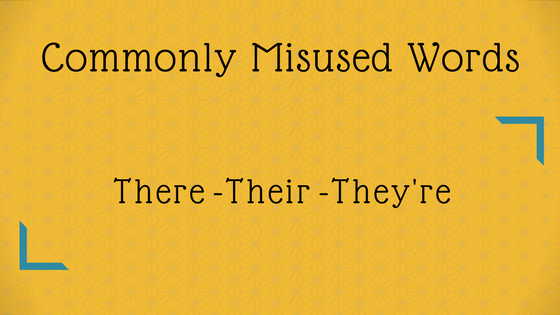Misused Words: There – Their – They’re

Posted on September 18, 2017
If you’ve spent much time with the English language, you know it has its quirks and twists. In English, many words sound exactly alike but have huge differences in meaning. For example, the pain in my arm is not the same as the glass pane in my window. Two very different meanings, two words exactly alike in their pronunciation that sound exactly the same.
It’s intriguing to me how often the simplest of words can trip up writers, myself included. So today’s post is about 3 words that sound the same but have a world of difference in their meanings. If you’ve grown up with English as your primary language, you might not have difficulty with these three. But for those for whom English is not your native language, this post might be a helpful refresher. Then again, even English speakers confuse these. So I guess there is something for us all.
There
First off, let’s take the word there. There is used to indicate the idea of placement or position. The ball is over “there” means that it’s not here in my hand, it’s in a different place. There has to do with position, placement, direction.
In addition, there is often used in a non-position way in various dialogue, “There, there, give it some time and you’ll forget all about it.” It’s kind of a consoling usage. Or you might read a sentence like this: “there you have it.” These uses violate the test of placement and position. But it’s what makes English rich and also very confusing.
Their
Then we come to our next usage: their. Our meaning now shifts from one of placement/position to one of possession. It’s their turn, their book, their phone, their seat. Their carries the idea of ownership. If I keep that in mind, I won’t make the mistake of saying:
“Put the box over their” or “there house is on the corner.” (incorrect)
They’re
The last word in our triad is they’re. It’s a contraction, which simply means it’s a combination of two words. In this case those two words are; “they”+”are.” The nice thing about contractions is they are easy to test for accuracy. Simply read the sentence back to yourself and substitute the two words of “they are” and see if it makes sense. The resulting sentence will scream at you if it’s out of place.
“They’re arriving soon.”
The test: “They are arriving soon.” (Sounds good).
“They’re almost home.”
The test: “They are almost home.” (Sounds good to me).
“There dog just ran away.”
The test: “They are dog just ran away.” (Nope. Something needs fixing here).
And there you have it. Three words that sound alike, mean different things entirely and are easy to confuse. Fortunately, they’re also easy to fix. Happy writing!
Ah, the wonders of the English language.
